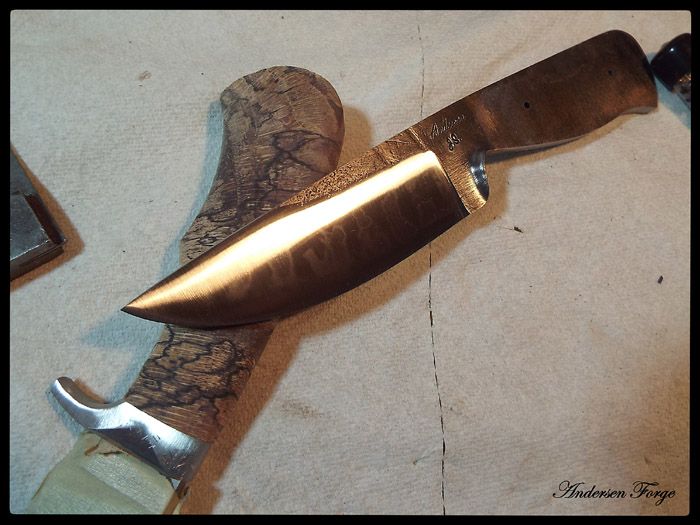Thanks for the reply, Brion.
What kind of measures do you use for the thickness of the cutting edge? I've been forging blades and rough grind to 1/16" before hardening, it seems very beefy to me but it's written in the "introduction to bladesmithing" by Jay hendrickson.
ok, problem solved about the thickness. 0.039" for spring steel and 0.062" for carbon steel?
Christophe, I usually go about .030 for my edges before heat treat on my steel. I leave the blade at 120 grit before heat treat.
Brion
Brion Tomberlin
Anvil Top Custom Knives
ABS Mastersmith
|quoted:
Yep TK, each run of steel may be slightly different, one of those things we have to deal with. If I am using stock from a new batch I will do some test blades to make sure I have things dead on with the heat treat. Those little variables in carbon content and alloy content can make a difference. I have been doing hamons long enough to know that there is a lot I do not know yet.
Christophe, the difference in color as you call it is mainly due to polishing. The softer area in the blade will polish or abrade differently than the hardened section. When the blade is etched the hardened area will appear black with a grey in the softer area. This is an oxide layer that I will take off then begin the real polishing work.
Brion
Brion: Thanks for the tip on the temperature - on this W-2 batch the highest I had gone before was 1465 - amazing what a 10 degree bump made on the hamon appearance. When I get a blade finished with your and Karl's advice I'll post it - quite a difference.
"Energy and persistence overcome all obstacles." Ben Franklin
I just remembered this thread and did a little Brute de Forge for a project and used no clay.
The blade is 1095, which is not as shallow hardening as W1 or W2.
This is a "no-clay" hamon:
It is entirely created by the heat, the mass of the steel and the speed of the quenchant.
Karl B. Andersen
Journeyman Smith


